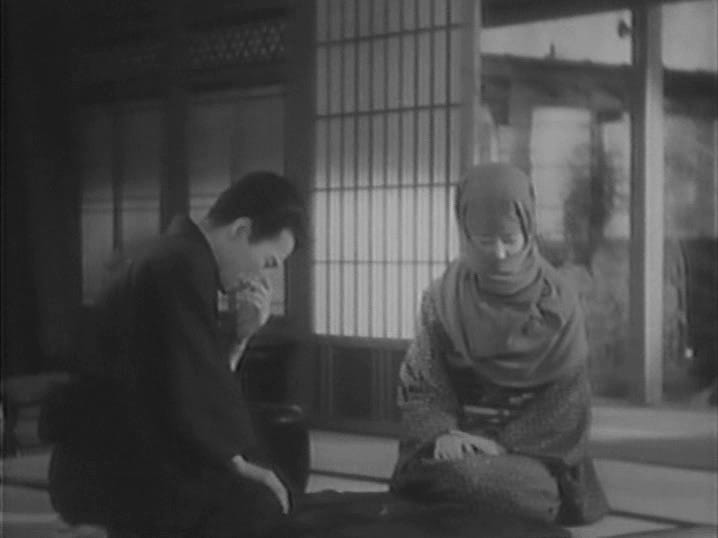The Narrow Aperture
On Yasujirô Shimazu's "Okoto and Sasuke" (1935)
Yasujirô Shimazu was born on June 3rd, 1897 – 98 years, to the day, before I was. Being a couple years short of a full century, this is not quite the sort of alignment of coincidence which tempts one to mysticism, but nonetheless, it’s close enough for me to feel a certain kind of kinship with him. Shimazu is a fairly obscure figure in the West, even among that minority of a minority who will watch a black-and-white movie from Japan not called Godzilla. If any of his films could be said to be “known” over here, it’s probably Our Neighbor, Miss Yae, a warm, low-stakes slice-of-life film which Akira Kurosawa once listed as one of his hundred favorites of all time. Shimazu’s surviving work circulates, as far as I’m able to track it, almost entirely via rips sourced from VHS dupes and a few barebones DVDs produced for the domestic market – certainly no deluxe Blu-rays, or anything aimed at an international audience. If subtitles exist, they’re probably not professional (the ones I watched Okoto and Sasuke with certainly weren’t). In a sense this is unsurprising, because Shimazu is an eminently “domestic” director; he was, as even his Letterboxd blurb will helpfully inform you, “a pioneer of the shōshimin-eiga (common people drama)”, which is to say his films are often centered around the “domestic” environment (which is not to say they are necessarily set in Japan; several of his later works concern life in the Empire’s colonies), and he died of cancer just before the end of World War II, which is to say he was making films more or less exclusively for a “domestic” audience, with no consideration for an international market. So, while his marginality overseas is understandable, it’s still unfortunate, because he is a great filmmaker, a sensitive, pragmatic conservative who shapes images with the confidence of one who has learned the craft not so much through studying it as through doing it, like Leo McCarey or John Ford. Okoto and Sasuke is my favorite of what I’ve thus far seen of his work, a melodrama of the Meiji period about a beautiful, blind koto player (Okoto; the great Kinuyo Tanaka) and her boundlessly devoted attendant (Sasuke; Kôkichi Takada, a few years before playing Fukusuke in Mizoguchi’s Story of the Last Chrysanthemums). There’s a sadomasochistic streak to many melodramas, especially ones of this vintage, but even by the standards of the time it is especially pronounced here: Sasuke spends most of the film addressing Okoto as Master (not Mistress), and the climax of the film, which, narratologically speaking, is very much akin to a sexual climax in its sudden intensity, arrives as an act of voluntary self-mutilation, motivated by a desire to obey as fully as possible his Master’s order. The suffocating formality of (in this case) Meiji social norms functions as a kind of emotional bondage – not a bondage to be resisted, the film seems to believe, but a bondage to embraced, to live one’s life constricted by, as it is by faultless propriety and self-sacrifice that one proves the depth and sincerity of one’s feelings. The villain of the film, a rich, drunken womanizer, is proven to be such by his sleazy (implied) attempt at raping Okoto, but we already knew he must be because he speaks coarsely and shows no special concern for etiquette. The virtuous here are virtuous because of their total submission, their absolute servility – this is Okoto’s attitude towards her art, and it is Sasuke’s attitude towards Okoto. Even a very straightforward scene where Okoto’s father and Sasuke’s father meet to discuss their children and their future is characterized by exchanges of scraping bows and long-winded expressions of gratitude, each seeming to try to prove to the other that it is he to whom a greater service is being done by their children remaining together as Master and attendant. These social rituals are not Shimazu’s invention, of course; my point is the attitude he chooses to take towards them. This is a film of discipline as freedom, bondage as liberation. When the moment in the drama arrives where the force of emotion is powerful it can no longer be contained, it is as though the characters are being choked by it, so immense is the pressure it exerts, so narrow the aperture through which it must be forced. I find this very sick, very perverse, and, above all else, deeply, profoundly romantic.


